七年级英语下册重难点
- 格式:doc
- 大小:154.00 KB
- 文档页数:11
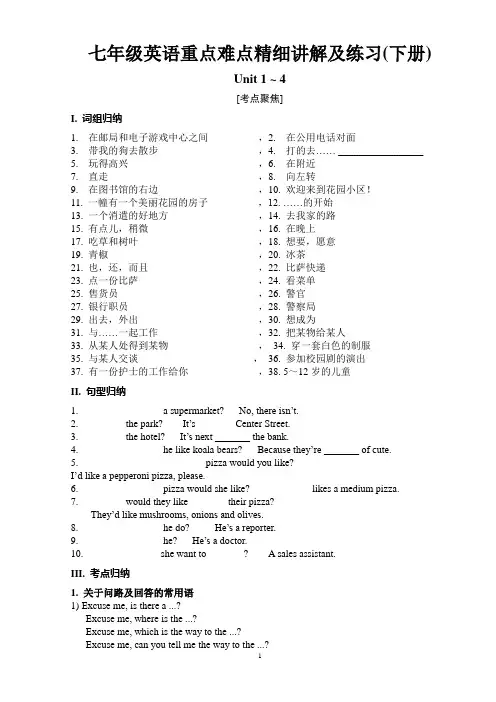
七年级英语重点难点精细讲解及练习(下册)Unit 1 ~ 4[考点聚焦]I. 词组归纳1. 在邮局和电子游戏中心之间_________,2. 在公用电话对面____________3. 带我的狗去散步_________________ ,4. 打的去…… _________________5. 玩得高兴_________________ ,6. 在附近_________________7. 直走_________________ ,8. 向左转_________________9. 在图书馆的右边________________ ,10. 欢迎来到花园小区!____________ 11. 一幢有一个美丽花园的房子_________,12. ……的开始__________________ 13. 一个消遣的好地方_________________,14. 去我家的路__________________ 15. 有点儿,稍微___________________ ,16. 在晚上___________________ 17. 吃草和树叶__________________ ,18. 想要,愿意__________________ 19. 青椒___________________ ,20. 冰茶___________________21. 也,还,而且___________________ ,22. 比萨快递___________________ 23. 点一份比萨___________________ ,24. 看菜单____________________ 25. 售货员_________________ ,26. 警官_________________27. 银行职员_________________ ,28. 警察局_________________29. 出去,外出_________________ ,30. 想成为_________________31. 与……一起工作__________________ ,32. 把某物给某人_________________ 33. 从某人处得到某物______________ ,34. 穿一套白色的制服____________ 35. 与某人交谈__________________ ,36. 参加校园剧的演出_____________ 37. 有一份护士的工作给你_____________,38. 5~12岁的儿童______________ II. 句型归纳1. _______ _______ a supermarket? No, there isn’t.2. _______ the park? It’s _______ Center Street.3. _______ the hotel? It’s next _______ the bank.4. _______ _______ he like koala bears? Because they’re _______ of cute.5. _______ _______ ________ pizza would you like?I’d like a pepperoni pizza, please.6. _______ _______ pizza would she like? _______ likes a medium pizza.7. _______ would they like _______ their pizza?They’d like mushrooms, onions and olives.8. _______ _______ he do? He’s a reporter.9. _______ _______ he? He’s a doctor.10. _______ _______ she want to _______? A sales assistant.III. 考点归纳1. 关于问路及回答的常用语1) Excuse me, is there a ...?Excuse me, where is the ...?Excuse me, which is the way to the ...?Excuse me, can you tell me the way to the ...?Excuse me, can you tell me how to get to the ...?Excuse me, how can I get to the ...?2) Go/Walk straight (along the street).Go/Walk along/up/down the street.Go/Walk along/up/down the street to the end.Go/Walk along/up/down the street about ten minutes.Turn (to the) left/right.Turn left/right at the traffic lights.Turn left/right at the second turning.(= Take the second turning on the left/right.)2. There’s a bank on the Central Street. 在中心路有一个银行。
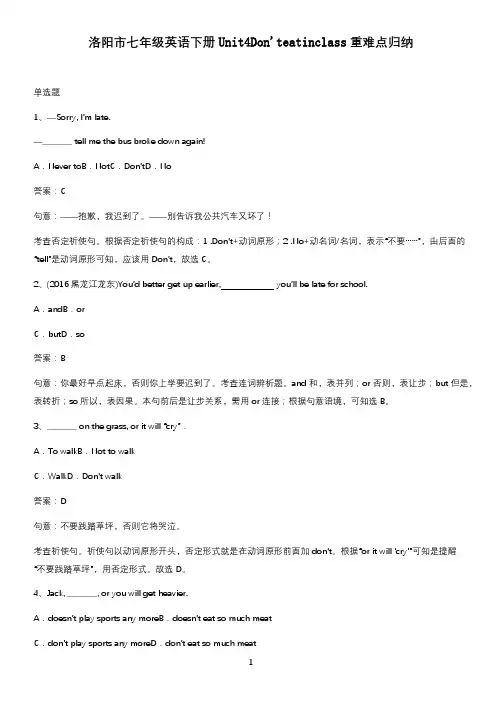
洛阳市七年级英语下册Unit4Don'teatinclass重难点归纳单选题1、—Sorry, I’m late.—________ tell me the bus broke down again!A.Never toB.NotC.Don’tD.No答案:C句意:——抱歉,我迟到了。
——别告诉我公共汽车又坏了!考查否定祈使句。
根据否定祈使句的构成:1 .Don’t+动词原形;2 .No+动名词/名词,表示“不要……”,由后面的“tell”是动词原形可知,应该用Don’t,故选C。
2、(2016黑龙江龙东)You’d better get up earlier, you’ll be late for school.A.andB.orC.butD.so答案:B句意:你最好早点起床,否则你上学要迟到了。
考查连词辨析题。
and和,表并列;or否则,表让步;but但是,表转折;so所以,表因果。
本句前后是让步关系,需用or连接;根据句意语境,可知选B。
3、________ on the grass, or it will “cry”.A.To walkB.Not to walkC.WalkD.Don't walk答案:D句意:不要践踏草坪,否则它将哭泣。
考查祈使句。
祈使句以动词原形开头,否定形式就是在动词原形前面加don‘t。
根据“or it will ‘cry’”可知是提醒“不要践踏草坪”,用否定形式。
故选D。
4、Jack, ________, or you will get heavier.A.doesn’t play sports any moreB.doesn’t eat so much meatC.don’t play sports any moreD.don’t eat so much meat句意:Jack,不要吃太多肉,否则你会变得更胖的。
考查否定祈使句。
否定祈使句应以“don’t”开头,排除A和B,由空后的“or you will get heavier”可知,应该是“不要吃如此多的肉”,排除C,故选D。

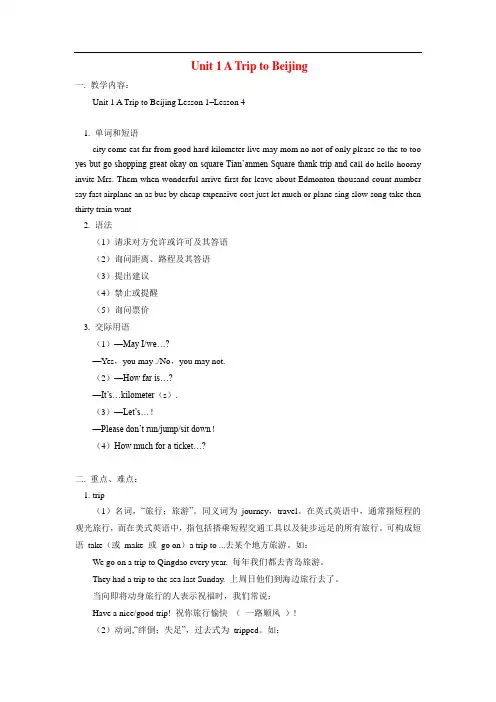
Unit 1 A Trip to Beijing一. 教学内容:Unit 1 A Trip to Beijing Lesson 1–Lesson 41. 单词和短语city come eat far from good hard kilometer live may mom no not of only please so the to too yes but go shopping great okay on square Tian’anmen Square thank trip and ca ll do hello hooray invite Mrs. Them when wonderful arrive first for leave about Edmonton thousand count number say fast airplane an as bus by cheap expensive cost just let much or plane sing slow song take then thirty train want2. 语法(1)请求对方允许或许可及其答语(2)询问距离、路程及其答语(3)提出建议(4)禁止或提醒(5)询问票价3. 交际用语(1)—May I/we…?—Yes,you may ./No,you may not.(2)—How far is…?—It’s…kilometer(s).(3)—Let’s…!—Please don’t run/jump/sit down!(4)How much for a ticket…?二. 重点、难点:1. trip(1)名词,―旅行;旅游‖。
同义词为journey,travel。
在英式英语中,通常指短程的观光旅行,而在美式英语中,指包括搭乘短程交通工具以及徒步远足的所有旅行。
可构成短语take(或make 或go on)a trip to ...去某个地方旅游。
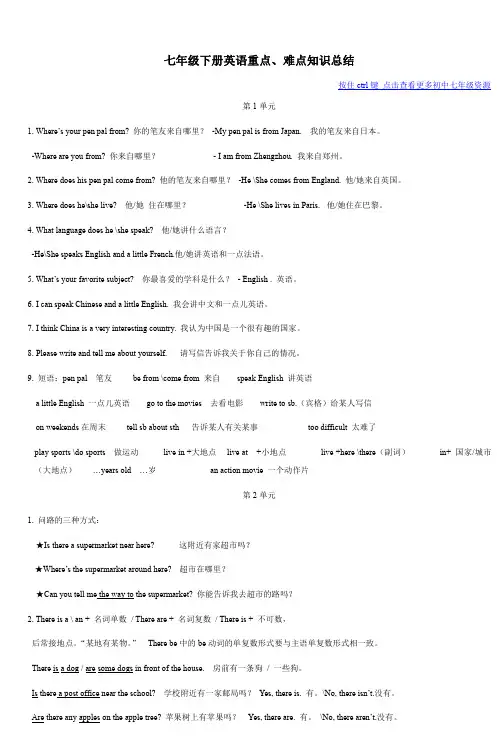
七年级下册英语重点、难点知识总结按住ctrl键点击查看更多初中七年级资源第1单元1.Where’s your pen pal from?你的笔友来自哪里?-My pen pal is from Japan.我的笔友来自日本。
-Where are you from?你来自哪里?-I am from Zhengzhou.我来自郑州。
2.Where does his pen pal come from?他的笔友来自哪里?-He\She comes from England.他/她来自英国。
3.Where does he\she live?他/她住在哪里?-He\She lives in Paris.他/她住在巴黎。
4.What language does he\she speak?他/她讲什么语言?-He\She speaks English and a little French.他/她讲英语和一点法语。
5.What’s your favorite subject?你最喜爱的学科是什么?-English.英语。
6.I can speak Chinese and a little English.我会讲中文和一点儿英语。
7.I think China is a very interesting country.我认为中国是一个很有趣的国家。
8.Please write and tell me about yourself.请写信告诉我关于你自己的情况。
9.短语:pen pal笔友be from\come from来自speak English讲英语a little English一点儿英语go to the movies去看电影write to sb.(宾格)给某人写信on weekends在周末tell sb about sth告诉某人有关某事too difficult太难了play sports\do sports做运动live in+大地点live at+小地点live+here\there(副词)in+国家/城市(大地点)…years old…岁an action movie一个动作片第2单元1.问路的三种方式:★Is there a supermarket near here?这附近有家超市吗?★Where’s the supermarket around here?超市在哪里?★Can you tell me the way to the supermarket?你能告诉我去超市的路吗?2.There is a\an+名词单数/There are+名词复数/There is+不可数,后常接地点。
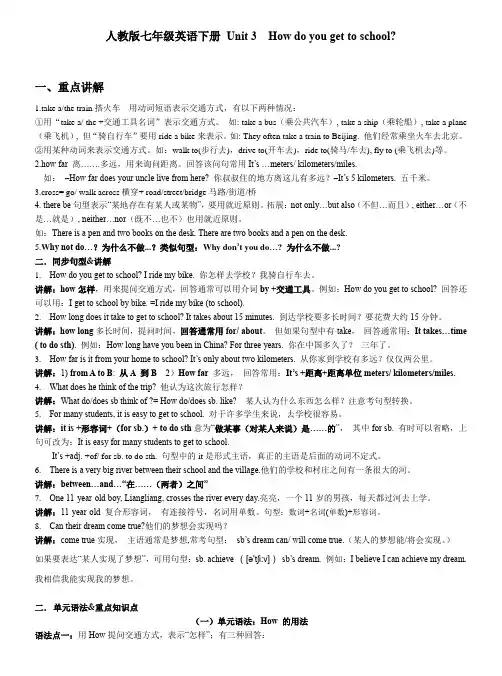
人教版七年级英语下册Unit 3 How do you get to school?一、重点讲解1.take a/the train搭火车用动词短语表示交通方式,有以下两种情况:①用“take a/ the +交通工具名词”表示交通方式。
如: take a bus(乘公共汽车), take a ship(乘轮船), take a plane (乘飞机), 但“骑自行车”要用ride a bike来表示。
如: They often take a train to Beijing. 他们经常乘坐火车去北京。
②用某种动词来表示交通方式。
如:walk to(步行去),drive to(开车去),ride to(骑马/车去), fly to (乘飞机去)等。
2.how far 离…….多远,用来询问距离。
回答该问句常用It’s …meters/ kilometers/miles.如:–How far does your uncle live from here? 你叔叔住的地方离这儿有多远?–It’s 5 kilometers. 五千米。
3.cross= go/ walk across横穿+ road/street/bridge马路/街道/桥4. there be句型表示“某地存在有某人或某物”,要用就近原则。
拓展:not only…but also(不但…而且), either…or(不是…就是), neither…nor(既不…也不)也用就近原则。
如:There is a pen and two books on the desk. There are two books and a pen on the desk.5.W hy not do…?为什么不做...?类似句型:Why don’t you do…? 为什么不做...?二.同步句型&讲解1.How do you get to school? I ride my bike. 你怎样去学校?我骑自行车去。
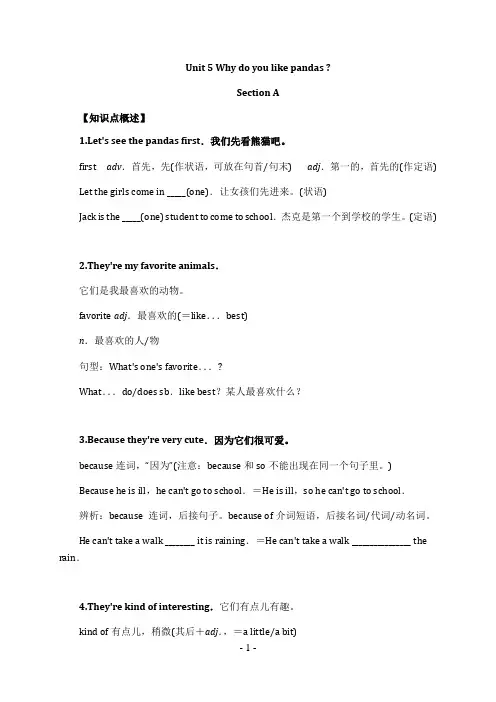
Unit 5 Why do you like pandas ?Section A【知识点概述】1.Let's see the pandas first.我们先看熊猫吧。
first adv.首先,先(作状语,可放在句首/句末) adj.第一的,首先的(作定语) Let the girls come in _____(one).让女孩们先进来。
(状语)Jack is the _____(one) student to come to school.杰克是第一个到学校的学生。
(定语)2.They're my favorite animals.它们是我最喜欢的动物。
favorite adj.最喜欢的(=like...best)n.最喜欢的人/物句型:What's one's favorite...?What...do/does sb.like best?某人最喜欢什么?3.Because they're very cute.因为它们很可爱。
because连词,“因为”(注意:because和so不能出现在同一个句子里。
)Because he is ill,he can't go to school.=He is ill,so he can't go to school.辨析:because 连词,后接句子。
because of介词短语,后接名词/代词/动名词。
He can't take a walk ________ it is raining.=He can't take a walk ________________ the rain.4.They're kind of interesting.它们有点儿有趣。
kind of有点儿,稍微(其后+adj.,=a little/a bit)kind n.种类,类型(a kind of 一种;all kinds of 各种各样的;different kind of 不同种类的)adj.和蔼的,亲切的句型:It's kind of sb.to do sth.某人做某事真是太好了。
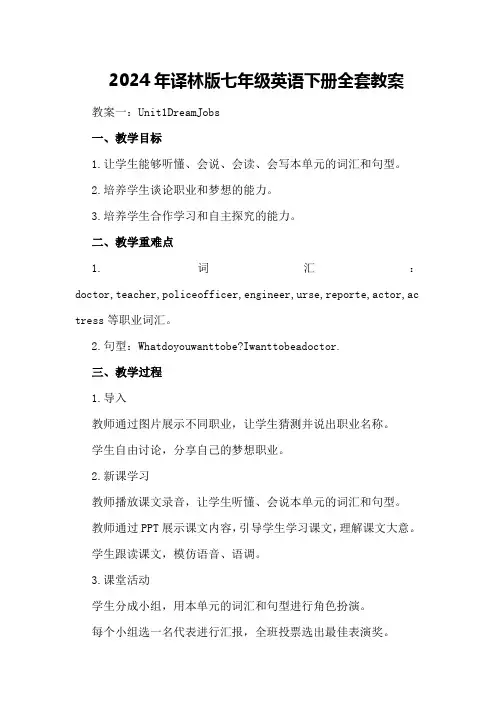
2024年译林版七年级英语下册全套教案教案一:Unit1DreamJobs一、教学目标1.让学生能够听懂、会说、会读、会写本单元的词汇和句型。
2.培养学生谈论职业和梦想的能力。
3.培养学生合作学习和自主探究的能力。
二、教学重难点1.词汇:doctor,teacher,policeofficer,engineer,urse,reporte,actor,ac tress等职业词汇。
2.句型:Whatdoyouwanttobe?Iwanttobeadoctor.三、教学过程1.导入教师通过图片展示不同职业,让学生猜测并说出职业名称。
学生自由讨论,分享自己的梦想职业。
2.新课学习教师播放课文录音,让学生听懂、会说本单元的词汇和句型。
教师通过PPT展示课文内容,引导学生学习课文,理解课文大意。
学生跟读课文,模仿语音、语调。
3.课堂活动学生分成小组,用本单元的词汇和句型进行角色扮演。
每个小组选一名代表进行汇报,全班投票选出最佳表演奖。
4.练习巩固教师设计一些练习题,让学生独立完成,巩固所学知识。
学生相互检查,纠正错误。
5.作业布置让学生用本单元的词汇和句型写一篇关于自己梦想职业的短文。
四、教学反思教案二:Unit2SchoolLife一、教学目标1.让学生能够听懂、会说、会读、会写本单元的词汇和句型。
2.培养学生谈论学校生活和课程安排的能力。
3.培养学生合作学习和自主探究的能力。
二、教学重难点1.词汇:math,English,Chinese,science,art,music,PE等课程名称。
2.句型:Whatsubjectsdoyouhave?Wehavemath,English,Chinese,science,ar t,music,andPE.三、教学过程1.导入教师通过图片展示不同课程,让学生猜测并说出课程名称。
学生自由讨论,分享自己的课程安排。
2.新课学习教师播放课文录音,让学生听懂、会说本单元的词汇和句型。

Unit 1 Can you play the guitar◆短语归纳1. play chess 下国际象棋2. play football 踢足球3. play the guitar 弹吉他4. play the violin 拉小提琴5. call sb. at给某人打电话6. want to do 想要做某事7. make friends with sb 和某人结交朋友8. play games 做游戏9 d o kung fu 练(中国) 功夫10 tell stories 讲故事11. on the weekend/on weekends 在周末12. speak English/Chinese 说英语/汉语13. English club 英语俱乐部14. talk to 跟…说15.talk with sb 和..谈话◆用法集萃1.1)play +棋类/球类下……棋,打……球(不加任何冠词)2)play the +西洋乐器弹/拉……乐器(加定冠词the)3)Play 后面跟玩具或者其他名词市,一般加介词with 例如:Dolphins can play with a ball. 海豚会玩球。
Play with sb. 和某人玩2. be good at doing sth.= do well in doing sth. 擅长做某事3. be good with sb=get on well with sb . 和某人相处地好4. need sb. to do sth. 需要某人做某事5. can + 动词原形能/会做某事6. a little + 不可数名词一点儿……7. join the …club 加入…俱乐部8. like to do sth. =love to do sth. 喜欢/喜爱做某事like doing sth= love doing sth9. What about sth/doing sth 做某事怎么样例如:What about having a rest?10.Let’s do sth 让我们做某事(let 后出现的动词用动词原形)例如:Let’s go swimming.◆重难点注释一.Can 的用法1. 表示能力She can sing that song in English. 她能用英文唱那首歌。
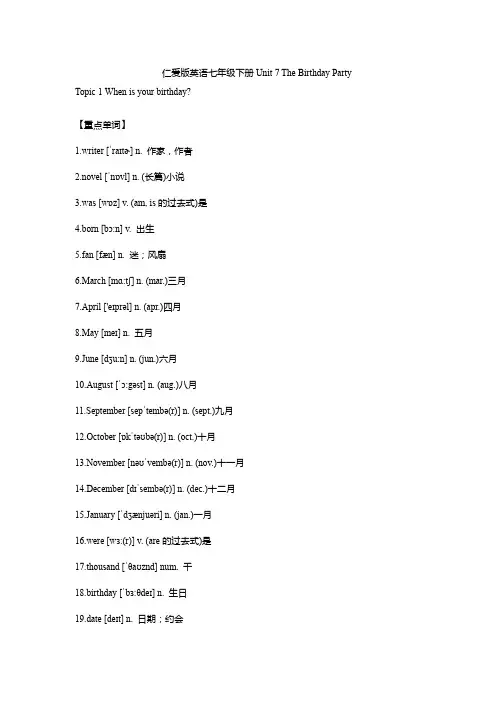
仁爱版英语七年级下册Unit 7 The Birthday Party Topic 1 When is your birthday?【重点单词】1.writer [ˈraɪtɚ] n. 作家,作者2.novel [ˈnɒvl] n. (长篇)小说3.was [wɒz] v. (am, is的过去式)是4.born [bɔ:n] v. 出生5.fan [fæn] n. 迷;风扇6.March [mɑ:tʃ] n. (mar.)三月7.April ['eɪprəl] n. (apr.)四月8.May [meɪ] n. 五月9.June [dʒu:n] n. (jun.)六月10.August [ˈɔ:gəst] n. (aug.)八月11.September [sepˈtembə(r)] n. (sept.)九月12.October [ɒkˈtəʊbə(r)] n. (oct.)十月13.November [nəʊˈvembə(r)] n. (nov.)十一月14.December [dɪˈsembə(r)] n. (dec.)十二月15.January [ˈdʒænjuəri] n. (jan.)一月16.were [wɜ:(r)] v. (are的过去式)是17.thousand [ˈθaʊznd] num. 千18.birthday [ˈbɜ:θdeɪ] n. 生日19.date [deɪt] n. 日期;约会20.calendar [ˈkælɪndə(r)] n. 日历21.plan [plæn] v. &n. 计划,打算22.celebrate ['selɪbreɪt] v. 庆祝23.party ['pɑ:tɪ] n. 聚会,宴会;党派24.fourth [fɔ:θ] num. 第四25.fifth [fɪfθ] num. 第五26.sixth [sɪksθ] num. 第六27.seventh ['sevnθ] num. 第七28.eighth [eɪtθ] num. 第八29.ninth [naɪnθ] num. 第九30.tenth [tenθ] num. 第十31.eleventh [ɪ'levnθ] num. 第十一32.twelfth [twelfθ] num. 第十二33.twentieth ['twentɪəθ] num. 第二十34.present ['preznt] n. 礼物35.shape [ʃeɪp] n. 形状v. 使成为……形状36.ball [bɔ:l] n. 球;舞会37.afraid [əˈfreɪd] adj. 担心;害怕38.star [stɑ:(r)] n. 星;明星39.mouse [maʊs] n. 老鼠40.square [skweə(r)] n. 正方形;广场;平方adj. 正方形的41.circle ['sɜ:kl] n. 圈,圆圈v. 圈出42.triangle ['traɪæŋɡl] n. 三角形43.rectangle [ˈrektæŋgl] n. 长方形;矩形44.oval ['əʊvl] n. 椭圆adj. 椭圆形的45.centimeter ['sentɪˌmi:tə] n. (cm)厘米46.Mrs. [ˈmɪsɪz] n. 太太,夫人47.cake [keɪk] n. 蛋糕【重点短语】1.be born 出生2.look at 看3.plan to do sth. 计划做某事4.have a birthday party 举办生日聚会5.the shape of ……的形状6.be like 像……7.how long 多长8.how wide 多宽e ... for ... 用……做……【重点句型】1.—When were you / was he/she born?你/他/她是什么时候出生的?—I/He/She was born on/in …我/他/她出生于……2.—Where were you / was he/she born?你/他/她在哪里出生的?—I/He/She was born in …我/他/她出生在……3.—When is your birthday?你的生日是什么时候?—May 13th.5月13号。
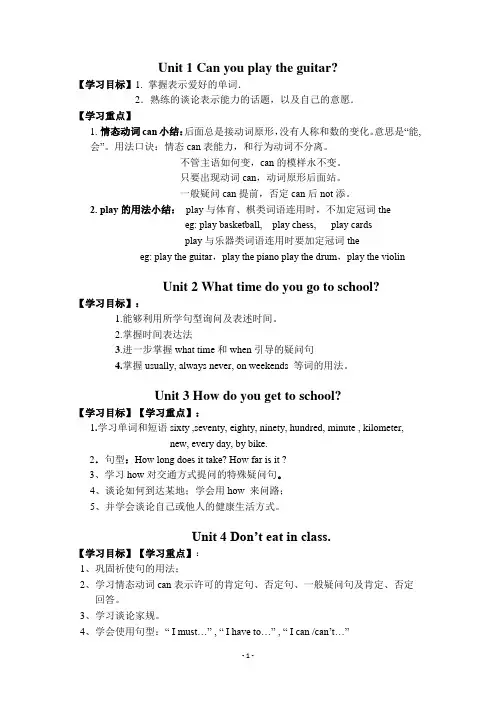
Unit 1Can you play the guitar?【学习目标】1. 掌握表示爱好的单词.2.熟练的谈论表示能力的话题,以及自己的意愿.【学习重点】1.情态动词can小结:后面总是接动词原形,没有人称和数的变化。
意思是“能,会”。
用法口诀:情态can表能力,和行为动词不分离。
不管主语如何变,can的模样永不变。
只要出现动词can,动词原形后面站。
一般疑问can提前,否定can后not添。
2. play的用法小结:play与体育、棋类词语连用时,不加定冠词theeg: play basketball, play chess, play cardsplay与乐器类词语连用时要加定冠词theeg: play the guitar,play the piano play the drum,play the violinUnit 2 What time do you go to school?【学习目标】:1.能够利用所学句型询问及表述时间。
2.掌握时间表达法3.进一步掌握what time和when引导的疑问句4.掌握usually, always never, on weekends 等词的用法。
Unit 3 How do you get to school?【学习目标】【学习重点】:1.学习单词和短语sixty ,seventy, eighty, ninety, hundred,minute , kilometer, new, every day, by bike.2.句型:How long does it take? How far is it ?3、学习how对交通方式提问的特殊疑问句。
4、谈论如何到达某地;学会用how 来问路;5、并学会谈论自己或他人的健康生活方式。
Unit 4 Don’t eat in class.【学习目标】【学习重点】:1、巩固祈使句的用法;2、学习情态动词can表示许可的肯定句、否定句、一般疑问句及肯定、否定回答。
Unit 10 Where did you go on vacation?一、教学内容:Unit 10 Where did you go on vacation?【具体教学内容】(一)语言功能:Talk about past events 谈论过去的事情(二)目标语言:1. Where did you/she/they go on vacation?I/ She/They went to summer camp.2. Did you/he/ she go to Central Park?Yes, I /he /she/they did.No, I/ he /she / they didn’t.(三)重点单词和词组1. summer camp 夏令营winter camp 冬令营2. friend 朋友friendly 友好的unfriendly 不友好的clear 清楚的unclear 不清楚的wele 受欢迎的unwele不受欢迎的real 真实的unreal 不真实的3. expensive 昂贵的(同)dear (反)cheapIt’s too expensive. I can’t buy it. 它太贵了,我买不起。
Are the books expensive or cheap? 这些书贵还是便宜?4. corner 角落,墙角in the corner 拐弯处的内角at the corner 拐弯处的外角He is standing in the corner. 他站在拐弯处。
5. decide v. 决定(1) decide + 名词或代词They can’t decide anything now.(2) decide to do We decide to help him.(3) decide+ wh- + to do She can’t decide where to go?练一练Her father decided ______ her himself.A. teachB. to teachC. teachingD. taught6. discuss v. 讨论(1) discuss sth. I want to discuss the problem with you.(2) discuss + wh- We are discussing when to start.7. back adv. 回原处,往回去go back 回去 e back 回来n. 背部,后面,后部in/ at the back of…在……后面at the back of the house(反) in front of / in the front of8. the Great Wall 长城He who does not reach the Great Wall is not a true man.不到长城非好汉。
Unit 1 Can you play the guitar?第一部分单词的词义拓展以及词组1.guitar n.吉他n.guitarist 吉他手play the guitar 弹吉他Leo is a guitarist.Leo是一个吉他手。
He can play the guitar.他能弹吉他。
2.sing v.唱歌n.singer 歌手adj.singable 可唱的过去式sang 过去分词sungJackson sings very well.He is a good singer. 杰克逊唱歌很好。
他是一个好的歌手。
3.swim v.游泳n.swimmer游泳者go swimming 去游泳过去式swam过去分词swumLily can swim.she is a good swimmer. 莉莉能游泳她是一个好的游泳者。
4.dance v.跳舞n.dancer 舞者,舞蹈家They dance at the party. 他们在聚会上跳舞。
My aunt is a ballet dancer.我的阿姨是一个芭蕾舞蹈者。
5.draw v.画画主要指线条画,不用颜料,而是用铅笔、钢笔粉笔绘画或者是素描画。
n. drawer 抽屉过去式drew 过去分词drawnpaint 是指用颜料绘画,画出来是彩色画. painter画家6.chess n.国际象棋play chess下国际象棋7.speak v.说话n.speaker 发言者过去式spoke 过去分词spoken词组:speak English说英语8.join v.加入参加某个组织或团体成为其成员之一如入团参军加入俱乐部等join the Youth League入团/join the army参军/join a music club加入音乐俱乐部9.club n.俱乐部社团可数名词10.tell v.讲述告诉teller 讲述者tell a story/joke 讲故事讲笑话过去式told 过去分词toldtell sb.about sth.告诉某人关于某事She tells me about her family.tell sb.to do sth 告诉某人去做My sister tells me to make dumplings.tell sb.not to do告诉某人不要做My mother tells me not to cheat others.11.story n.故事复数:stories storybook故事书12.write v.写作写字过去式wrote 过去分词writtenn.writer作者Mo Yan is a writer.莫言是一位作家。
最新】人教版七年级英语下册课文重难点讲解unit1n A1.Can you play the guitar?解析1】:Can是情态动词,表示某人具有做某事的能力。
它后面必须用动词原形。
XXX没有人称和数的变化。
它的否定句是在can的后面直接加not,也可以缩写为can't。
它的一般疑问句是把can放在句子的开头并且大写。
① XXX.② XXX.③ Can you sing some popular songs?解析2】:Play和表示球类的名词连用时需要用冠词;但是和表示乐器的名词连用的时候不需要用冠词。
① Play basketball。
play the piano (×)② My little sister can't swim now。
but she can XXX.③ Lily is an active girl and she is XXX.2."What club do you want to join?" "I want to join the art club."解析1】:句型What+名词+一般疑问句?可以提问人物的身份、姓名、内容、性质和类别,也可以提问事物的目的、价格、数量和效果。
1.你在哪个班级?2.你的自行车是什么颜色?3.你想买什么尺码的?4.你想加入哪个俱乐部?1.请问你是哪个班的学生?2.你的自行车是什么颜色?3.你想购买哪个尺码的商品?4.你有意向加入哪个俱乐部?Marry XXX related to it。
She has a choice een the music club。
art club。
tennis club。
and sports club。
In response to the n "Can you speak English?"。
the answer is "Yes。
Module 12 A holiday journey一. 教学内容:Module 12 A holiday journey二. 重点、难点一般过去时(V)三.具体内容:(一)一般过去时(V)1. 有些动词的过去式的变化是不规则的。
如:be —was/ were do —dideat— ate go—wenthave— had leave— leftmake— made meet— metsee—saw spend —-spentswim — swam take — tookcome—came send—- sentwrite —- wrote read —- readsit— sat buy — bought2. 不规则动词一般过去时的肯定、否定、一般疑问句以及特殊疑问句都与规则动词的相同。
(二)知识辅导:1. —What are you going to do on holiday, Tony?—We’re going to Los Angeles.—你假期打算做什么,托尼?—我打算去洛杉矶。
洛杉矶是美国第二大城市,位于加利福尼亚州,该城市以好莱坞和迪斯尼乐园而文明于世。
be on holiday / have a holiday 在度假例如:I’m on holiday in London with my friend Jenny.我和詹妮在伦敦度假2. We had a great time. 我们玩得很高兴。
Have a great time/ good time/ enjoy oneself玩得很高兴3. How long did it take to get there? 去那里要用多长时间?It take sb. some time to do sth. 某人做某事花多长时间It takes me 2 hours to Jinan by bus yesterday.昨天我乘公共汽车去济南花了2 小时。
人教版七年级英语下册Unit 4 Don’t eat in class一、重点讲解1.Don’t do sth. 不要做某事,祈使句的否定句。
2.in class上课,in the class在课室。
注意:有the 和没the的区别。
te adj. 迟的、晚的,如:be late, be late for sth;adv.修饰行为动词,放行为动词后, 如:arrive late for, work late,get up late 等。
如:1)I am sorry I am late. 对不起,我迟到了。
2)She is late for class. 她上课迟到了。
4.fight 打架,拓展:fight with sb. 与某人打架5.practice +n/ doing sth. 练习某事/做某事6.get sth for sb. 为某人拿某物,get指“去拿来”7.noisy adj. 嘈杂的;喧闹的拓展:noise n. 噪音; make noise制造噪音8.keep (my)hair short 留短发拓展:keep sth. adj. 使某物保持…(的状态);keep sb. doing… 使某人一直做…二.同步句型&讲解1.What are the rules? We must be on time for class. 规章制度是什么?我们必须按时上课。
讲解:on time按时; in time及时2.We also have to be quiet in the library.而且我们在图书馆必须安静。
讲解:also 也,放在肯定句句中(行前be后)。
3.There are too many rules. 有太多的规章制度。
讲解:too many +可数名词复数:太多4.Don’t leave the dirty dishes in the kitchen.别把脏盘子留在厨房。
仁爱版英语七年级下册Unit 8 The Seasons and the Weather Topic 1 How is the weather in winter?【重点单词】1.weather ['weðə(r)] n. 天气2.spring [sprɪŋ] n. 春天3.warm [wɔ:m] adj. 温暖的;热心的4.season [ˈsi:zn] n. 季节5.summer ['sʌmə(r)] n. 夏天6.hot [hɒt] adj. 热的;辣的7.climb [klaɪm] v. 爬,攀登8.winter ['wɪntə(r)] n. 冬天9.cold [kəʊld] adj. 冷的n. 寒冷;感冒10.rain [reɪn] v. 下雨n. 雨11.snow [snəʊ] v. 下雪n. 雪12.rainy ['reɪnɪ] adj. 阴雨的,多雨的13.remember [rɪˈmembə(r)] v. 记得;记起14.raincoat [ˈreɪnkəʊt] n. 雨衣15.outside [ˌaʊtˈsaɪd] adv. 在外面,向外面16.snowy ['snəʊɪ] adj. 下雪多的17.windy ['wɪndɪ] adj. 多风的,风大的18.foggy ['fɒɡɪ] adj. 有雾的19.cloudy ['klaʊdɪ] adj. 多云的,阴天的20.bright [braɪt] adj. 明亮的21.temperature [ˈtemprətʃə(r)] n. 温度22.low [ləʊ] adv. 低;矮23.holiday ['hɒlədeɪ] n. 假期24.umbrella [ʌmˈbrelə] n. 伞25.sunglasses [ˈsʌnglɑ:sɪz] n. 太阳镜26.shorts [ʃɔ:ts] n. 短裤27.travel [ˈtrævl] v. & n. 旅行,旅游28.wear [weə(r)] v. 穿,戴29.suddenly[ˈsʌdənli]adv. 突然30.shine [ʃaɪn] v. 发光,照耀31.better [ˈbetə(r)] adv. 更好32.Australia [ɒ'streɪlɪə] n. 澳大利亚33.most [məʊst] det. & pron. 大多数adv. 最34.sun [sʌn] n. 太阳,阳光35.brightly ['braɪtlɪ] adv. 明亮地36.heavily [ˈhevɪli] adv. 猛烈地37.harvest ['hɑ:vɪst] n. & v. 收割;收获38.busy ['bɪzɪ] adj. 忙于(做某事);忙碌的39.leaf /liːf/ n. 叶子40.wind [wɪnd] n. 风41.strongly [strɒŋlɪ] adv. 强烈地42.ice [aɪs] n. 冰43.hat [hæt] n. (常指带檐的)帽子44.opera /ˈɒprə/ n. 歌剧;歌剧剧本45.ourselves [ɑ:ˈselvz] pron. 我们自己46.hope [həʊp] v. & n. 希望,期望47.trip [trɪp] n. 旅行,旅游48.noon [nuːn] n. 正午,中午【重点短语】1.put on 穿上,戴上2.had better 最好e back to life 复苏;复活e out 开花;出版,发行5.right away 立即,马上6.make snowmen 堆雪人7.climb hills 爬山8.go outside 外出9.remember to do sth. 记得要做某事10.the lowest temperature 最低温度11.the highest temperature 最高温度ter on 稍后;过些时候【重点句型】1.—What’s the weather like in spring?春天的天气怎么样?—It’s warm. It’s a good season for flying kites.很温暖。